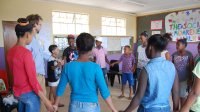Lessons Learned From Great Schools Around the World
A former teacher discusses what he learned in his travels across four continents.
Your content has been saved!
Go to My Saved Content.Much has been written recently about the differences between education systems around the world, but much less has been said about what excellent schools around the world have in common. Over the past year, I’ve visited top-ranked schools across four continents and met an extremely diverse array of school leaders. Amid this diversity, I was surprised when each leader described the same three priorities as fundamental to their schools’ success. From Singapore to Switzerland, South Africa to India, these three practices recurred with remarkable consistency.
Building a Collaborative Staff Culture
“Every teacher needs two things: to know that they can grow, and to feel that they are not alone.” —Principal at Ruggenacher School in Switzerland
In the U.S., many schools are built on structures without substance. Take professional development and teacher collaboration, for example. Professional development is almost always delivered with a top-down approach, and the teachers attending the sessions often feel that it’s compartmentalized and irrelevant to their own day-to-day work. Teacher collaboration, when it exists, is often just a time on a schedule. If there are expectations attached to it, they rarely have anything to do with planning or instruction.
By contrast, the excellent schools I visited believe that meaningful collaboration and professional development should be central parts of a teacher’s experience. Both teachers and administrators describe systems built on a belief in bottom-up initiatives and top-down support. In most of these schools, teachers spend as much of their time collaborating and engaging in professional development as they do in front of students.
It’s hard to overstate how much the teachers appreciate this dynamic. They enjoy being pushed by their colleagues to think more deeply about their pedagogy, and together they drive their own development. The result is motivated and confident teachers who feel secure in their identities as professionals and proud to be part of an effort that is larger than themselves.
Focusing on Values Over Academics
“It doesn’t matter what they become. I tell them every single day, ‘I don’t care what you become—it’s who you become and what you’re going to do with that light inside of you.’” —Teacher at a SPARK School in South Africa
When I asked teachers about their top priorities for students, nearly all of them mentioned values and relationship skills before academics. In practice, this means that teachers treat students with a great deal of respect, and the students feel like the school is looking out for them as individuals. This dynamic has an enormous impact on both student and teacher morale. It turns out that students who feel valued as individuals become much more motivated in their academics, and teachers who see their role as helping to mold students’ values get a lot more fulfillment from their jobs. As another teacher from a SPARK (Service, Persistence, Achievement, Responsibility, Kindness) School told me, “You have such a big impact on what they become eventually, and that’s a very powerful thing to think of as a teacher. It’s like, ‘Wow, I have a part in you.’”
Of course, this doesn’t mean that content is watered down. These schools have some of the most academically rigorous classrooms I’ve ever seen. A focus on values doesn’t supplant academics, it complements them.
Giving Students Real Power
“It works because we give the students the whole responsibility. . . . Trust is the foundation of high expectations.” —Principal at Unterstrass Comprehensive School in Switzerland
Every few years, the adults at Unterstrass in Switzerland leave the students alone on campus, and they don’t return for three days. After months of preparation and mentoring, the students take over the administrative offices and run every aspect of the school from teaching to maintenance to the cafeteria. When the adults return, they lead two days of reflection about the experience.
In the U.S., we tend to confuse responsibility with compliance. A student is responsible if they do what they are asked to do. But this level of responsibility doesn’t actually help students grow as individuals. For that, they need opportunities to think creatively. They need to be in situations where success depends on their being proactive.
Most schools don’t do anything as drastic as leaving students fully in charge, but every excellent school I have visited understood that helping students develop responsibility means giving them power they must be responsible for. At Riverside in India, it means using design thinking to create initiatives for the school and outside communities. At Southern Cross in Chile, it means embracing cooperative learning. In all of these places, the power comes with a great deal of structure and guidance, but instead of guiding with directions, the teachers at these schools ask questions instead.
All of the top-ranked schools I visited were different. They were all rooted in their local contexts and informed by the unique personalities of the their leadership. But I was truly amazed at how consistently the three practices above reappeared over and over, even in the most distant corners of the world. Together they come down to a belief in people and a belief that education is about experiences as much as content.
